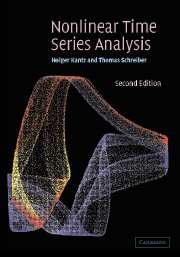Book contents
- Frontmatter
- Contents
- Preface to the first edition
- Preface to the second edition
- Acknowledgements
- I Basic topics
- 1 Introduction: why nonlinear methods?
- 2 Linear tools and general considerations
- 3 Phase space methods
- 4 Determinism and predictability
- 5 Instability: Lyapunov exponents
- 6 Self-similarity: dimensions
- 7 Using nonlinear methods when determinism is weak
- 8 Selected nonlinear phenomena
- II Advanced topics
- A Using the TISEAN programs
- B Description of the experimental data sets
- References
- Index
5 - Instability: Lyapunov exponents
Published online by Cambridge University Press: 06 July 2010
- Frontmatter
- Contents
- Preface to the first edition
- Preface to the second edition
- Acknowledgements
- I Basic topics
- 1 Introduction: why nonlinear methods?
- 2 Linear tools and general considerations
- 3 Phase space methods
- 4 Determinism and predictability
- 5 Instability: Lyapunov exponents
- 6 Self-similarity: dimensions
- 7 Using nonlinear methods when determinism is weak
- 8 Selected nonlinear phenomena
- II Advanced topics
- A Using the TISEAN programs
- B Description of the experimental data sets
- References
- Index
Summary
Sensitive dependence on initial conditions
The most striking feature of chaos is the unpredictability of the future despite a deterministic time evolution. This has already been made evident in Fig. 1.2: the average error made when forecasting the outcome of a future measurement increases very rapidly with time, and in this system predictability is almost lost after only 20 time steps. Nevertheless we claim that these experimental data are very well described as a low dimensional deterministic system. How can we explain this apparent contradiction?
Example 5.1 (Divergence of NMR laser trajectories). In Fig. 5.1 we show several segments of the NMR laser time series (the same data underlying Fig. 1.2; see Appendix B.2) which are initially very close. Over the course of time they separate and finally become uncorrelated. Thus it is impossible to predict the position of the trajectory more than, say, ten time steps ahead, knowing the position of another trajectory at this time which was very close initially. (This is very much in the spirit of the prediction scheme of Section 4.2.)
The above example illustrates that our every day experience, “similar causes have similar effects”, is invalid in chaotic systems except for short periods, and only a mathematically exact reproduction of some event would yield the same result due to determinism. Note that this has nothing to do with any unobserved influence on the system from outside (although in experimental data it is always present) and can be found in every mathematical model of a chaotic system.
This unpredictability is a consequence of the inherent instability of the solutions, reflected by what is called sensitive dependence on initial conditions.
Information
- Type
- Chapter
- Information
- Nonlinear Time Series Analysis , pp. 65 - 74Publisher: Cambridge University PressPrint publication year: 2003
Accessibility standard: Unknown
Why this information is here
This section outlines the accessibility features of this content - including support for screen readers, full keyboard navigation and high-contrast display options. This may not be relevant for you.Accessibility Information
- 1
- Cited by
